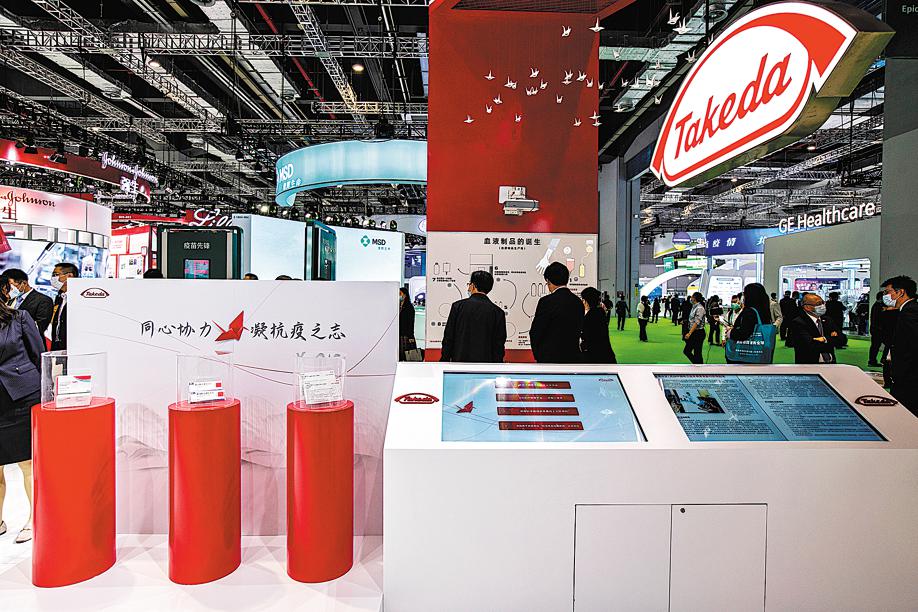Takeda to ride opening-up for bigger share in Chinese market

Visitors gather at the Takeda Pharmaceutical booth during the third China International Import Expo in Shanghai in November. [Photo/CHINA DAILY]
Bullish on China's innovation-driven biopharmaceutical environment, Takeda Pharmaceutical Co vows to further enlarge its investment in China, a top official of the Japanese drugmaker said.
Takeda plans to raise its revenue growth in emerging markets to account for one-fifth of its projected total by fiscal year 2031, up from the current roughly 13 percent, said Ricardo Marek, president of Takeda's growth and emerging markets business unit.
China is the largest contributor in terms of both size and pace of growth, and is on track to become Takeda's second-largest market by the 2031 fiscal year, Marek said.
"From the standpoint of our headquarters, we are maximizing capital allocation to China, such as increasing operational expenses, number of people, expanding to third and fourth-tier cities and public hospitals," he said.
As part of Takeda's headquarters in China, Takeda Development Center Asia was moved to the Qiantan Center Building in the China (Shanghai) Pilot Free Trade Zone on Oct 20, a move to take advantage of the development of the country's biopharmaceutical industry to fulfill its commitment to Chinese patients.
The free trade zone is building a biopharmaceutical industrial zone to promote the development of China's biopharmaceutical industry.
"In the company's global strategies, China has always been an important market. We have been increasing our investments in China ever since 2015. Between 2015 and 2020, we invested in China over 1.5 billion yuan ($234.9 million) to accelerate the research and development of innovative products in the country," said Sean Shan, president of Takeda China.
Last year, Takeda expanded its production base in Tianjin, and in the same year, Takeda launched its five-year development plan in China, Shan said.
According to the plan, the company will launch at least 15 innovative drugs and seek to become one of the Top 10 multinational pharmaceutical companies in China. It will increase market distribution channels, and improve drug accessibility and patient service capabilities to benefit more than 10 million local patients.
"In the future, we hope to ride Shanghai free trade zone's high-quality opening-up to accelerate the process of introducing innovative products and technologies to China, and help Shanghai build a world-class biopharmaceutical industry cluster," Shan said.
The biopharmaceutical industry is one of the three strategic industries that Shanghai has been supporting. In October 2020, the Shanghai municipal government issued an action plan to promote the development of Shanghai's biopharmaceutical industrial zone.
That action plan said that by 2022, the biopharmaceutical industrial zone should have nearly 8.3 million square meters of available land and raise the manufacturing output value to over 170 billion yuan. By 2025, there should be nearly 17.3 million sq m of available land for the industry, and the city's biopharmaceutical industry should reach a worth of 1.2 trillion yuan.
Zhao Yuan, deputy head of the Organizing Committee of the Shanghai 2010 World Expo of the China (Shanghai) Pilot Free Trade Zone Administration, said: "In the past 30 years, Pudong has always been a hot destination for foreign investment. It is also a window of China's high-quality opening-up. No matter judging from the development of Pudong, or the expectation of launched policies, the area has created perfect development conditions for multinational biopharmaceutical companies."
"In the future, the organizing committee will fully support the development of foreign biopharmaceutical companies, such as Takeda, in China, so as to accelerate their process of introducing innovative products and technologies to the country, to benefit patients in China and contribute to the construction of the biopharmaceutical industrial cluster in Pudong," he said.
Shan also lauded China's innovative biopharmaceutical environment.
"We are confident that in the coming 10 to 20 years, China will become one of the origins of biopharmaceutical innovations in the world. With the introduction of our 15 innovative drugs and the Wave 1 Pipeline reaching a crucial inflection point in China, we hope to take advantage of our innovative capabilities and international experience to promote the high-quality development of China's biopharmaceutical industry, and integrate into the construction of China's biopharmaceutical innovation system," he said.


